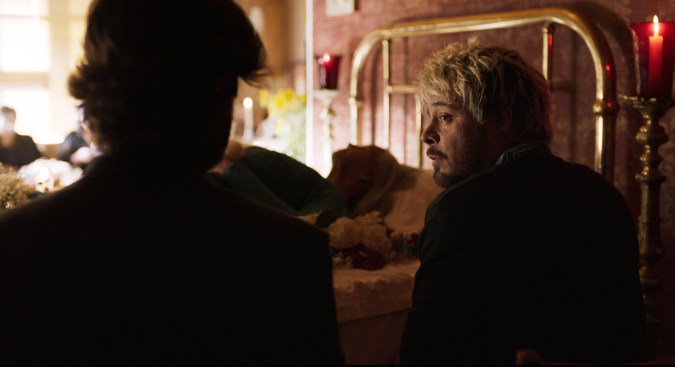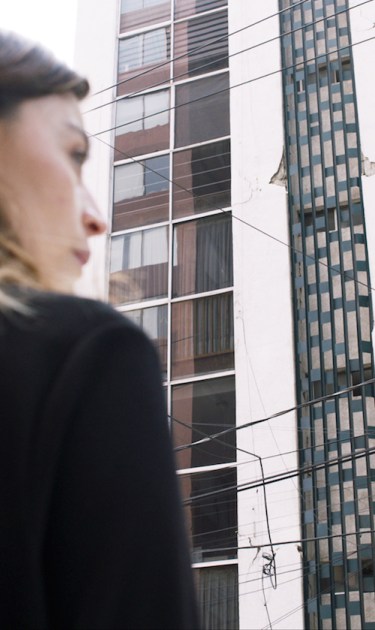“Que culebrón!” So one character describes the increasingly telenovela-esque plots that thread themselves through Matías Meyer’s Amores modernos. He’s on to something. The ensemble dramedy, after all, gathers a family for a funeral and in the process introduces us to a secret sister, a changed and contested will, a breakup that leads to leg paralysis, an Alzheimer’s diagnosis, and an extramarital affair. Add in a subplot about an impending natural birth, a keynote talk about why we make decisions, as well as an earthquake, and this examination of, as its title suggests, all kinds of “modern loves” establishes itself as a contemporary Mexican film that toys with and pays homage to those culebrones we love to watch on Televisa. And with a big-screen sensibility that feels close to vintage Almodóvar and Manolo Caro’s recent work, Meyer shows a heartfelt desire to explode how it is we talk about love in the 21st century.
The film’s sprawling ensemble is led by Rubén Pablos who plays Luis, the patriarch of the family. After enjoying an early-morning romp with his wife Armida (Concepción Márquez) and as he doses off in the bath by himself, Luis becomes a widower when Armida falls to her death in the kitchen. Her accidental death prompts a gathering that brings their family under one roof for the first time in years. That includes their two sons, the uptight Carlos (Andrés Almeida) who’s in an unhappy marriage with Ana (Ludwika Paleta) and Alex (a bleach-blond Leonardo Ortizgris), who hasn’t been home in a while since his coming out disrupted the family’s careful balance. Also attending the funeral are Carlos’ best friend (David Angulo) who may or may not have a thing for his wife and Rocio (Ilse Salas), a young woman no one else knows but who’s all too close with Luis. Over the course of the long day and night they all spend together, their rivalries and resentments, their desires and their frustrations bubble up to the surface.
In the vein of movies like Love, Actually and Valentine’s Day (though stripped of the cloying sentimentality that usually characterizes those Hollywood flicks), Amores modernos navigates various relationships between fathers, brothers, neighbors and girlfriends to think through tricky concepts around intimacy and love. Despite it opening with a death and grappling with a dysfunctional family, for example, the film never feels like a dour drama. Instead, it plays more like a bouncy comedy that’s unafraid to go to quite emotionally dark places.

Meyer’s work with his actors is arguably what makes Amores modernos so watchable. Each member of the cast has one or two moments where the film requires them to pull focus and they all deliver: Ortizgris is funny and affable even as he plays the resentful gay slacker who nevertheless has to find himself now comforting the father that once all but threw him out; and as Rocio’s recently-dumped boyfriend Pavel, Raúl Briones gets one hell of a scene where, wheelchair-bound, he’s called up to deliver a keynote about decision-making all while trying to fight back tears about his breakup. And that’s not to talk about Paleta’s anguished performance as a wife ready to plunge headfirst into an affair or Pablos’ careful attention to Luis’ Alzheimer’s-affected moods.

But no actor comes close to embodying the frayed yet tender sensibility of Amores modernos quite like Ilse Salas. The Las niñas bien star, here devoid of the period trappings of that 2018 drama, is loose and warm as Rocio. A no-nonsense physician who counsels teenagers on sex ed (“You can have as much sex as you want,” she tells a young woman, emphasizing she should feel in control when it comes to her sexuality and her body), Rocio is the half-sister Alex and Carlos never knew they had: turns out Luis had a “casa chica,” another family, he’d kept from his sons and wife. It is she who first rattles and then relaxes the family; she may be going through a sudden breakup but she finds in her newfound brothers and in Luis a bedrock where to start building her life anew. As she leads her siblings in a booze-fueled dance break (to Santa Sabina’s “Chicles,” no less), you can see her freewheeling ways easing those around her, reminding all of us that moments of crisis can also be moments of growth, and that love truly can be a healing power.
If Amores modernos has a thesis at all it is that kindness (and love, really) takes work. As an emotion it may seem like a reflex or an instinct, but it’s a conscious exercise, one that requires care. Relationships are both broken and mended, healed and severed throughout the film, and its sprawling ensemble gets at the many ways we struggle to connect with one another. But ultimately, it encourages us all to be more loving and more caring. Like those culebrones of yore, it wants us to imagine a happily ever after, not forgetting it often takes months of plot twists to get there.
Amores modernos had its world premiere at Los Cabos International Film Festival.




